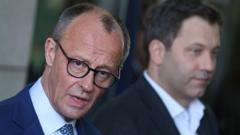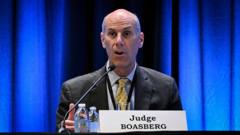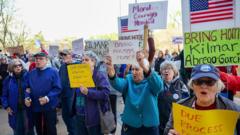After five months of political deadlock following the collapse of the previous government, Friedrich Merz's conservatives have successfully reached an agreement with the Social Democrats to form a new governing coalition in Germany, the largest economy in Europe.
Germany's Merz Strikes Coalition Deal, Ending Political Stalemate

Germany's Merz Strikes Coalition Deal, Ending Political Stalemate
Friedrich Merz's conservative coalition partners with Social Democrats to form a government amid growing political and economic challenges in Germany.
Germany's political landscape had been rife with uncertainty following the federal elections in February, where Merz's Christian Democrats emerged as a significant contender. With ongoing pressures from economic instability and the rising popularity of the far-right group Alternative for Germany (AfD), the newly formed coalition aims to bring stability and reform to the nation.
As Merz, 69, announces the coalition deal, he emphasizes that the agreement sends "a strong and clear signal" to both Germans and the European Union regarding the country's path forward. "We will have a strong government capable of action," Merz affirmed, underlining the importance of swift governance in the wake of economic turbulence influenced by external factors such as Donald Trump's trade tariffs.
Despite a 13-seat majority in the parliament awaiting electoral confirmation next month, Merz's optimism regarding the coalition agreement suggests a unified front among party members, who have worked diligently in recent weeks to address key issues affecting voters.
The newly established coalition's agenda includes significant reforms to Germany's strict debt regulations, which will enable increases in military funding and investment into deteriorating infrastructure. Moreover, addressing immigration concerns, the coalition plans to implement measures aimed at "controlling and largely ending irregular migration" and establishing stricter border controls.
An Ipsos poll indicates a close race, as the AfD has garnered 25% support, overtaking Merz's conservatives at 24%, signaling an urgent need for the new coalition to address voters' concerns and swiftly carry out its action plan. With the anticipation of beginning its work by early May, this coalition hopes to restore confidence in German politics and Europe as a whole.
As Merz, 69, announces the coalition deal, he emphasizes that the agreement sends "a strong and clear signal" to both Germans and the European Union regarding the country's path forward. "We will have a strong government capable of action," Merz affirmed, underlining the importance of swift governance in the wake of economic turbulence influenced by external factors such as Donald Trump's trade tariffs.
Despite a 13-seat majority in the parliament awaiting electoral confirmation next month, Merz's optimism regarding the coalition agreement suggests a unified front among party members, who have worked diligently in recent weeks to address key issues affecting voters.
The newly established coalition's agenda includes significant reforms to Germany's strict debt regulations, which will enable increases in military funding and investment into deteriorating infrastructure. Moreover, addressing immigration concerns, the coalition plans to implement measures aimed at "controlling and largely ending irregular migration" and establishing stricter border controls.
An Ipsos poll indicates a close race, as the AfD has garnered 25% support, overtaking Merz's conservatives at 24%, signaling an urgent need for the new coalition to address voters' concerns and swiftly carry out its action plan. With the anticipation of beginning its work by early May, this coalition hopes to restore confidence in German politics and Europe as a whole.




















